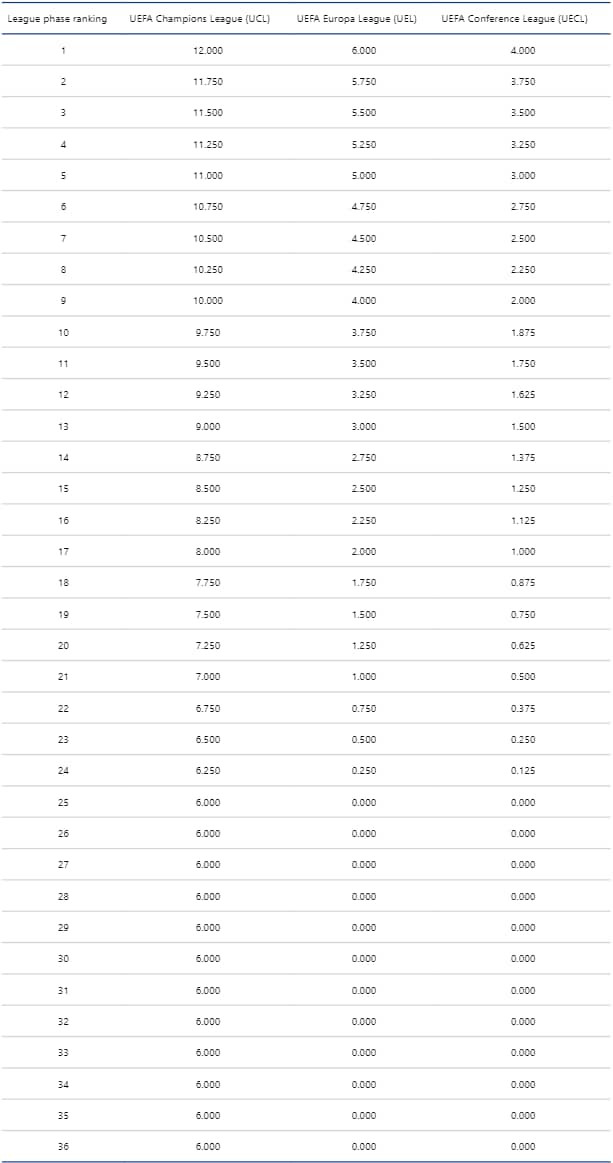Unlock the mystery behind Football Country Ratings! This article explains the calculation, importance, and factors influencing these ratings. Discover how CAUHOI2025.UK.COM can provide you with in-depth analysis and insights. Understand association coefficients, bonus points, and ranking criteria used to determine football country success.
1. Understanding Football Country Rating Systems
Football country ratings, often referred to as association coefficients, are a crucial metric used to rank the performance of different countries in European club competitions. These ratings influence the number of teams each country can enter into tournaments like the UEFA Champions League, UEFA Europa League, and UEFA Conference League. Understanding how these ratings are calculated and what factors contribute to them is essential for anyone interested in the dynamics of European football.
1.1. What is a Football Country Rating?
A football country rating, or association coefficient, is a numerical value that reflects the collective performance of a country’s clubs in UEFA club competitions over a rolling five-year period. This system, governed by UEFA regulations, determines the allocation of slots for each association in the subsequent seasons of the Champions League, Europa League, and Conference League.
1.2. Importance of Football Country Ratings
The importance of football country ratings lies in their direct impact on club participation in prestigious European tournaments. Higher-ranked countries receive more slots, including direct entry into the group stages, which translates to increased revenue and prestige for their clubs. These ratings also influence seeding in draws, potentially affecting a team’s chances of advancing in the competitions.
1.3. Factors Influencing Football Country Ratings
Several factors influence a country’s football rating, including:
- Club Performance: Wins, draws, and progression through the various stages of UEFA competitions significantly contribute to a country’s coefficient.
- Bonus Points: Bonus points are awarded for reaching certain stages of the competitions, such as the round of 16, quarter-finals, semi-finals, and the final.
- Number of Participating Clubs: The total points earned by a country’s clubs are divided by the number of clubs representing that association in the competitions.
2. Calculation of Association Coefficients
The calculation of association coefficients involves a detailed methodology outlined by UEFA. This section breaks down the process step-by-step to provide a clear understanding of how these ratings are derived.
2.1. Points System for Matches
Points are awarded to clubs based on their results in UEFA Champions League, UEFA Europa League, and UEFA Conference League matches:
- Win: 2 points (1 point for qualifying and play-off matches)
- Draw: 1 point (0.5 points for qualifying and play-off matches)
- Defeat: 0 points
These points are accumulated throughout the season for each club representing a particular association.
2.2. Bonus Points for Tournament Progress
In addition to match points, clubs can earn bonus points for advancing to specific stages of the competitions. According to UEFA regulations, clubs are awarded bonus points based on their final position in the league phase rankings, and reaching the knockout stages:
 UEFA Bonus Points
UEFA Bonus Points
- Champions League: 1.5 extra points for reaching the round of 16, quarter-finals, semi-finals, or final.
- Europa League: 1 extra point for reaching the round of 16, quarter-finals, semi-finals, or final.
- Conference League: 0.5 extra points for reaching the round of 16, quarter-finals, semi-finals, or final.
2.3. Calculating the Season Coefficient
The season coefficient for an association is calculated by summing up all the points earned by its clubs in a given season and then dividing the total by the number of clubs from that association that participated in the three UEFA club competitions. For instance, if an association sends six clubs and they collectively earn 60 points, the season coefficient would be 10.000.
2.4. Aggregating Over Five Seasons
UEFA uses the season coefficients from the five most recent seasons to determine the association’s position in the access list. These five season coefficients are added together to create a cumulative total, which then determines the rankings. This rolling five-year window ensures that the rankings reflect recent performance while still accounting for longer-term trends.
3. Examples of Football Country Ratings
To illustrate how football country ratings work in practice, let’s consider hypothetical examples of how different associations might accumulate points over a five-year period.
3.1. Hypothetical Scenario 1: Strong Consistent Performance
Imagine Association A consistently performs well in all three UEFA competitions. Their season coefficients over the past five years are:
- 2018/19: 16.500
- 2019/20: 17.250
- 2020/21: 18.000
- 2021/22: 17.750
- 2022/23: 18.500
The cumulative total for Association A would be 88.000, placing them among the top-ranked associations.
3.2. Hypothetical Scenario 2: Fluctuating Performance
Association B experiences more variability in their performance. Their season coefficients are:
- 2018/19: 12.000
- 2019/20: 14.500
- 2020/21: 11.750
- 2021/22: 15.250
- 2022/23: 13.000
The cumulative total for Association B would be 66.500, placing them in a mid-tier position.
3.3. Hypothetical Scenario 3: Emerging Association
Association C is an emerging football nation with improving performance over time. Their season coefficients are:
- 2018/19: 7.500
- 2019/20: 8.250
- 2020/21: 9.000
- 2021/22: 10.500
- 2022/23: 11.750
The cumulative total for Association C would be 47.000, indicating their gradual rise in the rankings.
4. Rules and Regulations Governing Football Country Ratings
UEFA has specific rules and regulations governing the calculation and application of football country ratings. These rules ensure fairness and consistency in determining the allocation of slots for European competitions.
4.1. UEFA Regulations Overview
The UEFA regulations, particularly Annex D, provide a comprehensive overview of the coefficient ranking system. These regulations detail how points are awarded, how coefficients are calculated, and how rankings are determined. It’s crucial for clubs and associations to understand these rules to maximize their performance and representation in European competitions.
4.2. Tie-Breaking Criteria
In cases where two or more associations have equal coefficients, UEFA applies tie-breaking criteria to determine their final rankings. The primary criterion is the coefficient in the most recent of the seasons on which the rankings are based. If the coefficients are still equal, the next most recent season is considered until a difference is found.
4.3. Impact of Club Exclusion
If a club is excluded from a UEFA competition or refuses to participate, the association’s coefficient is calculated by dividing the total number of points obtained by its clubs by the number of clubs the association was entitled to enter according to the access list. This rule prevents associations from benefiting when a club’s exclusion might otherwise inflate their coefficient.
5. Strategies for Improving Football Country Ratings
Associations can employ various strategies to improve their football country ratings and secure more slots in European competitions.
5.1. Investing in Youth Development
Investing in youth development programs is a long-term strategy that can yield significant results. By nurturing young talent and providing them with opportunities to develop, associations can improve the overall quality of their clubs and increase their competitiveness in European competitions. According to a report by the U.S. Soccer Federation, countries with strong youth development programs tend to perform better in international competitions.
5.2. Strengthening Domestic Leagues
A strong domestic league provides a solid foundation for clubs to compete effectively in Europe. Associations should focus on improving the competitiveness, infrastructure, and financial stability of their domestic leagues. This can attract better players, improve the quality of play, and ultimately enhance the performance of clubs in UEFA competitions.
5.3. Strategic Club Management
Clubs play a crucial role in improving an association’s coefficient. Strategic management, including smart player recruitment, effective coaching, and financial prudence, can help clubs perform better in European competitions. Clubs should also focus on developing a strong team culture and fostering a winning mentality.
5.4. Collaboration and Knowledge Sharing
Associations can benefit from collaborating and sharing knowledge with other successful football nations. This can involve exchanging best practices, participating in joint training programs, and learning from the experiences of others. Such collaboration can help associations identify areas for improvement and implement effective strategies to enhance their performance.
6. The Role of Data Analytics in Football Country Ratings
Data analytics plays an increasingly important role in football, including in the context of country ratings. Clubs and associations can use data to gain insights into player performance, team dynamics, and opponent strategies.
6.1. Analyzing Player Performance
Data analytics can provide valuable insights into player performance, helping clubs identify strengths and weaknesses. This information can be used to make informed decisions about player recruitment, training, and tactics. According to a study by the University of Michigan’s Sports Management Department, clubs that effectively use data analytics in player evaluation tend to have a competitive advantage.
6.2. Assessing Team Dynamics
Analyzing team dynamics can reveal how different players interact and contribute to the overall performance of the team. This can help coaches optimize team lineups, develop effective strategies, and foster a positive team environment. Data on passing accuracy, possession, and defensive actions can provide valuable insights into team dynamics.
6.3. Predicting Match Outcomes
Data analytics can be used to predict match outcomes based on historical data, player statistics, and other relevant factors. This information can help clubs prepare for matches, develop effective game plans, and make informed decisions during games. While predictions are not always accurate, they can provide a valuable tool for strategic planning.
7. Historical Trends in Football Country Ratings
Analyzing historical trends in football country ratings can provide insights into the evolution of European football and the shifting balance of power among different associations.
7.1. Dominant Associations
Historically, a few associations have consistently dominated the top of the football country ratings. These include England, Spain, Germany, and Italy. Their strong domestic leagues, successful clubs, and significant investments in football development have contributed to their sustained success.
7.2. Emerging Associations
In recent years, some associations have emerged as strong contenders, challenging the traditional dominance of the top-ranked countries. These emerging associations have benefited from strategic investments in youth development, improved domestic leagues, and effective club management.
7.3. Factors Contributing to Shifts in Rankings
Several factors can contribute to shifts in football country rankings, including economic changes, political developments, and changes in UEFA regulations. For example, increased investment in football infrastructure and player development in certain countries can lead to improved performance and higher rankings.
8. The Future of Football Country Ratings
The future of football country ratings is likely to be shaped by ongoing changes in the football landscape, including the increasing influence of data analytics, the globalization of the sport, and potential reforms to UEFA competitions.
8.1. Potential Changes to UEFA Competitions
UEFA is continually evaluating and refining its competition formats to enhance the excitement and competitiveness of European football. Any changes to the structure of the Champions League, Europa League, and Conference League could have a significant impact on football country ratings.
8.2. Impact of Financial Fair Play
Financial Fair Play (FFP) regulations aim to promote financial stability and sustainability among European clubs. The effectiveness of FFP in leveling the playing field and preventing excessive spending could influence the distribution of success in UEFA competitions and, consequently, football country ratings.
8.3. The Role of Globalization
The globalization of football is leading to increased movement of players and coaches around the world. This can have a significant impact on the competitiveness of different associations and their performance in European competitions. Associations that effectively integrate foreign talent and adapt to global trends are likely to improve their football country ratings.
9. Case Studies: Successful and Unsuccessful Associations
Examining case studies of successful and unsuccessful associations can provide valuable lessons for associations seeking to improve their football country ratings.
9.1. Case Study 1: England – A Model of Success
England’s sustained success in European football can be attributed to a combination of factors, including a strong domestic league, significant investments in youth development, and effective club management. The English Premier League is one of the most competitive and financially lucrative leagues in the world, attracting top players and coaches from around the globe.
9.2. Case Study 2: Netherlands – A Resurgence
The Netherlands experienced a period of decline in European football but has since rebounded, thanks to strategic investments in youth development and a renewed focus on tactical innovation. Dutch clubs have also benefited from a strong emphasis on developing young talent and providing them with opportunities to play in top European leagues.
9.3. Case Study 3: Scotland – Overcoming Challenges
Scotland has faced challenges in maintaining its competitiveness in European football, due to limited financial resources and a relatively small player pool. However, Scottish clubs have shown resilience and have made progress in recent years by focusing on developing young talent and implementing innovative coaching techniques.
10. Expert Insights and Analysis on Football Country Ratings
To gain a deeper understanding of football country ratings, it’s essential to consult expert insights and analysis from reputable sources.
10.1. Analysis from Sports Economists
Sports economists can provide valuable insights into the economic factors that influence football country ratings. Their analysis can reveal how investments in infrastructure, player development, and marketing can impact the competitiveness of clubs and associations.
10.2. Perspectives from Football Journalists
Football journalists offer on-the-ground perspectives on the factors that contribute to the success or failure of different associations. Their reporting can provide insights into the political, social, and cultural dynamics that shape the football landscape.
10.3. Insights from Coaches and Managers
Coaches and managers can offer practical insights into the strategies and tactics that can help clubs perform better in European competitions. Their experience can provide valuable lessons for associations seeking to improve their football country ratings.
FAQ: Football Country Ratings
1. How often are football country ratings updated?
Football country ratings are updated at the end of each season, reflecting the performance of clubs in UEFA competitions over the previous five years.
2. What happens if a country’s clubs perform poorly in a particular season?
Poor performance in a season can negatively impact a country’s coefficient, potentially leading to a lower ranking and fewer slots in future UEFA competitions.
3. Can a country improve its rating quickly?
Improving a country’s rating quickly is challenging, as the system is based on a rolling five-year window. However, significant success in a single season can provide a boost and set the stage for future improvement.
4. Do domestic league results affect football country ratings?
While domestic league results do not directly affect football country ratings, a strong domestic league can provide a solid foundation for clubs to compete effectively in European competitions.
5. How do bonus points impact the overall rating?
Bonus points can significantly impact the overall rating, as they reward clubs for advancing to the later stages of UEFA competitions.
6. What is the significance of the five-year period?
The five-year period ensures that the rankings reflect recent performance while still accounting for longer-term trends.
7. Are there any planned changes to the coefficient system?
UEFA continually evaluates and refines its competition formats, so changes to the coefficient system are possible in the future.
8. How do the ratings affect smaller football nations?
The ratings can have a significant impact on smaller football nations, as they determine the number of clubs that can participate in European competitions.
9. Where can I find the latest football country ratings?
The latest football country ratings can be found on the official UEFA website.
10. How can I learn more about football country ratings?
You can learn more about football country ratings by consulting UEFA regulations, sports economics research, and expert analysis from football journalists and coaches.
Ready to dive deeper into football country ratings and understand how they impact your favorite teams and leagues? At CAUHOI2025.UK.COM, we provide comprehensive analysis and insights into the world of football. Whether you’re a student, a young professional, or a seasoned expert, we have the information you need to stay informed and ahead of the game.
Do you have questions about football country ratings or other football-related topics?
Visit CauHoi2025.UK.COM today to explore our resources, ask questions, and connect with our community of experts. Let us help you navigate the complexities of the sport and gain a competitive edge. You can also visit our office at Equitable Life Building, 120 Broadway, New York, NY 10004, USA or call us at +1 (800) 555-0199. We’re here to provide the answers you seek!

